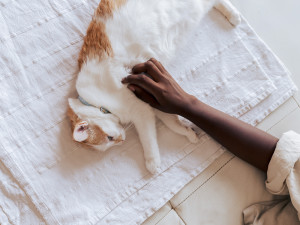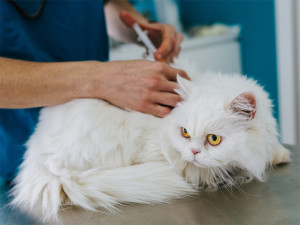Heartworm in Cats: Do They Get The Disease and What to Know
Dogs are the natural target for these worms, but that doesn’t mean your cat isn’t at risk.

Share Article
In This Article:
What Is Heartworm Disease in Cats? Heartworm-Associated Respiratory Disease Symptoms of Heartworm Disease in Cats Causes of Heartworm Disease in Cats How Veterinarians Diagnose Heartworm Disease in Cats Recovery and Management of Heartworm Disease in Cats Prevention of Heartworm Disease in Cats Frequently Asked Questions
Have you ever been bitten by a mosquito while inside your home? A silly question, right? Most of us have received numerous mosquito bites indoors. Yet, it’s a common statement from pet parewnts that indoor pets don’t need heartworm prevention. That’s a myth. Here’s a second myth: Cats don’t need heartworm prevention because dogs are the hosts, not cats. While it’s true that cats are atypical hosts, that doesn’t mean they can’t get heartworm. Heartworms seldom mature in cats, but the immature stages can cause severe inflammation and organ damage. Also, a few larvae develop into adults; unfortunately, they can live in a cat for two to three years.
Heartworm disease is a serious and potentially fatal condition that affects cats,but it is often overlooked because of these myths. Here are the scary facts: (1) Heartworms have been diagnosed in cats that live exclusively indoors. (2) There is no approved treatment for heartworm disease in cats. The only thing you can do to keep your cat from dying of heartworm is use prevention. Keeping your cat indoors won’t protect them; being an atypical host doesn’t do it. That’s why heartworm prevention is so essential for all cats.
There’s more to learn, and this comprehensive guide will teach you everything you need to know. We will cover the symptoms and causes of heartworm disease in cats as well as diagnosis, treatment, recovery, and prevention.

What is heartworm disease in cats?
Heartworm disease involves severe lung and heart inflammation. It is caused by a parasitic worm, Dirofilaria immitis, and its carriers are mosquitoes. A mosquito infected with this parasite’s larvae (microfilariae) can transmit the microscopic heartworm larvae into the cat’s bloodstream when it bites.
In dogs, the natural host, the larvae grow into adults and reproduce. As stated earlier, cats are not the natural host but instead are what is called an atypical host. Most of the time, the larvae die before becoming adults. However, even immature heartworms are very dangerous in cats. They can trigger an intense immune response, leading to severe lung and heart inflammation.
Heartworm-associated respiratory disease (HARD)
You may wonder why heartworms are so dangerous in cats, even though larvae rarely grow to become adults. The main complication is heartworm-associated respiratory disease (HARD). Because immature worms often die in the lungs instead of developing into adults, they cause inflammation similar to asthma or bronchitis.
How long do heartworms live in cats?
As mentioned, heartworm larvae rarely mature in cats, but they still cause damaging effects. However, a few can become adults; if they do, they can live in a cat for two to three years. Either form of the parasite can damage the lungs and blood vessels and even be fatal.
Symptoms of heartworm disease in cats
Heartworms can cause various symptoms in cats. Some show no symptoms, and in others, the first symptom is death. Between those extremes are various respiratory problems.
Common symptoms of heartworm disease
Respiratory distress: Coughing, wheezing, and labored breathing.
Vomiting: Often unrelated to food intake.
Lethargy: Reduced energy and activity levels.
Weight loss: Progressive weight loss, despite normal appetite.
Loss of appetite: Refusal to eat or reduced interest in food.
Seizures or difficulty walking: Rare, but possible if heartworms affect the nervous system.
Sudden collapse or sudden death: Some cats die suddenly due to acute heartworm complications.
Many of these symptoms are identical to other feline illnesses. Therefore, heartworm disease is often diagnosed as asthma, bronchitis, or digestive disorders. In addition, a critical condition in cats is feline hypertrophic cardiomyopathy, which causes sudden death in many cats. Since most of these cats do not undergo a necropsy (autopsy), heartworm disease is often missed, meaning our count of cats who suffer from or die of heartworm disease could be very off.
Causes of heartworm disease in cats
To reiterate, cat heartworm disease is caused by a parasitic worm, Dirofilaria immitis. This parasite’s larvae (microfilariae) can infect a mosquito and transmit the larvae into the cat’s bloodstream.
Heartworm disease is spread exclusively through mosquito bites. Even indoor cats are at risk because mosquitoes can enter homes through windows, doors, or vents.
How does a cat get heartworm disease?
The heartworm transmission cycle follows these steps:
A dog infected with adult heartworms has larvae (microfilariae) in their bloodstream.
When a mosquito bites the dog, it picks up the microfilariae.
The mosquito then bites a cat and transmits the larvae.
The larvae travel through the cat’s bloodstream and settle in the heart and lungs.
In cats, most larvae do not become adult heartworms. Unfortunately, even larvae damage cats’ lungs and bloodstream by causing severe inflammation.
Are some cats more at risk?
Any cat can get heartworm disease, even indoor cats, but the risk is higher in:
Outdoor cats: More exposure to mosquitoes.
Cats living in warm, humid climates: Areas with high mosquito populations for a larger percentage of the year.
Cats living near dogs: Dogs are the actual hosts and serve as heartworm reservoirs.
How veterinarians diagnose heartworm disease in cats
It is difficult to diagnose heartworms in cats because the available tests are for dogs. The tests are less reliable since cats rarely have adult worms or only a few.
Common diagnostic methods
Antigen test: This test detects proteins from adult female worms. Because cats rarely have adult worms or have only a few, that creates a lot of false negatives.
Antibody test: This test detects the body’s immune response to heartworm. It doesn’t tell you that an infection is present.
Chest x-rays (radiographs): Can show lung inflammation consistent with heartworm disease.
Echocardiogram (heart ultrasound): Helps detect worms in the heart or blood vessels.
Because no single test is 100 percent reliable, veterinarians often use multiple tests to confirm heartworm disease in cats.
Treatment of heartworm disease in cats
There is a drug that kills heartworms in dogs, although the treatment has risks. However, there is no treatment for cats.
Why is there no approved treatment for cats?
Melarsomine is the drug that kills heartworm in dogs. Melarsomine is toxic to cats, unlike dogs. There is no safe drug to kill heartworms in cats.
How is heartworm disease treated in cats?
If a cat gets infected with heartworm, there is no direct treatment to kill the worms. Instead, treatment focuses on any symptoms the cat may have.
Corticosteroids (prednisone): Reduces lung inflammation.
Bronchodilators: Helps cats breathe more easily.
Oxygen therapy: Used in severe cases of respiratory distress.
Hospitalization: Intensive care may be necessary if a cat experiences a heartworm crisis.
Can surgery remove heartworms in cats?
Removing worms surgically from the heart is a very risky procedure and is rarely performed.
Recovery and management of heartworm disease in cats
Long-term lung damage is the consequence of surviving a heartworm infection in a cat.
Ongoing monitoring and veterinary care
Regular check-ups to monitor lung health.
Chest x-rays or ultrasounds as needed.
Continued use of anti-inflammatory medications if necessary.
How long does it take for a cat to recover?
If a cat has a lungworm infection and survives, it can take a variable time to recover. If the infection is severe, there may be lifelong respiratory issues. Otherwise, the cat may recover within months.
Prevention of heartworm disease in cats
Unfortunately, there is no heartworm treatment in cats. There is also no way to keep mosquitoes away. A monthly heartworm preventative is the only way to protect your kitty.
Best heartworm preventatives for cats
Veterinarians recommend monthly heartworm preventatives, such as:
Selamectin (Revolution)
Moxidectin (Advantage Multi)
Ivermectin (Heartgard for Cats)
Milbemycin oxime (Interceptor)
Additional preventative measures
Keep cats indoors to reduce mosquito exposure.
Use window screens and mosquito repellents designed for pets.
Eliminate standing water where mosquitoes breed.
Bottom line
Every pet parent should know that not only do dogs get heartworm disease, but cats can get it, too — even indoor cats. If a dog gets infected, there is a medication that treats the disease. However, there is no treatment for cats. Cat heartworm disease is serious, and because it can’t be treated, every cat should be on a monthly heartworm preventative.
FAQs
How likely is a cat to get heartworm?
While cats get infected with heartworm less frequently than dogs, we do not know exactly the extent of feline infections. Dogs are tested regularly for heartworm, while cats are rarely tested unless they have severe respiratory infections. However, we know that cats get infected, especially in mosquito-heavy areas.
Do cats need to be on heartworm prevention?
Absolutely. All cats should receive monthly heartworm preventatives, even indoor-only cats.
Can heartworms transfer from dogs to cats?
No. Heartworms are only transmitted through mosquito bites, not direct contact.
References
Atkins, Clarke E., et al. “Heartworm Infection in Cats: 50 Cases (1985–1997).opens in new tab” Journal of the American Veterinary Medical Association, vol. 217, no. 3, Aug. 2000, pp. 355–358.
“Home.”opens in new tab American Heartworm Society.
Lee, Alice C. Y., and Clarke E. Atkins. “Understanding Feline Heartworm Infection: Disease, Diagnosis, and Treatment.”opens in new tab Topics in Companion Animal Medicine, vol. 25, no. 4, 1 Nov. 2010, pp. 224–230.
Litster, Annette L., and Richard B. Atwell. “Feline Heartworm Disease: A Clinical Review.” opens in new tabJournal of Feline Medicine and Surgery, vol. 10, no. 2, Apr. 2008, pp. 137–144.

Jodi Helmer
Jodi Helmer is a North Carolina-based freelance writer who shares her home with an embarrassing number of rescue dogs and relies on four feral cats to patrol the barn. When she isn’t refilling food and water dishes, Jodi writes about animals for Scientific American, Sierra, WebMD, AKC Family Dog, Living the Country Life, and Out Here.

Dr. Chyrle Bonk, DVM
Dr. Chyrle Bonk has been a mixed-animal veterinarian since 2010, with a special interest in rehabilitation. When she's not practicing or writing about veterinary medicine, you may find her exploring the outdoors with her family or tending to her cows, horses, chickens, or cats and dogs.
Related articles
![grey and white cat with tongue sticking out]()
Why Does My Cat Keep Throwing Up?
Here’s when you should worry.
![Unrecognizable woman petting an ill cat]()
5 Common Types of Cancer in Cats, Symptoms, and Treatments
Learn how to spot the early signs to how to treat them.
![Young person veterinarian in their veterinary clinic performing a medical examination on a pet.]()
What to Know About Rabies in Cats
There is one way to make sure your cat stays safe: vaccinate, vaccinate, vaccinate.
![Owner pets senior ginger cat.]()
6 Common Health Concerns in Senior Cats
How to spot and how to treat them.
![Brown Labrador lifting front leg]()
How to Get a Head Start on Your Pet’s Health
Spot lumps, limps, and lethargy early on.
![An orange cat coughing on a bed.]()
How to Help an Asthmatic Cat Breathe Easy
Everything you need to know about feline asthma, from someone who’s been there.








